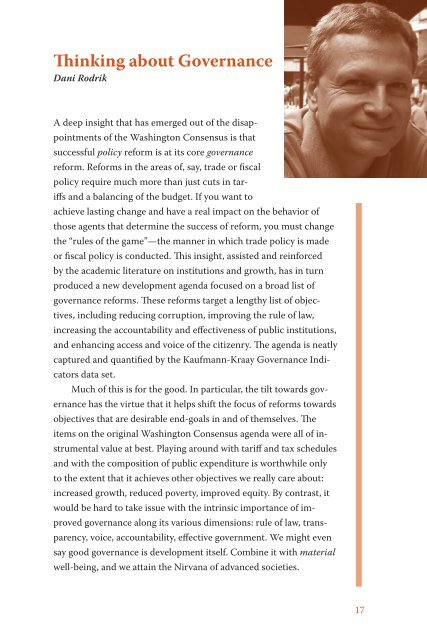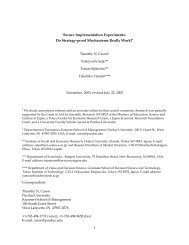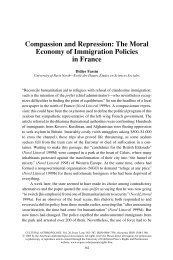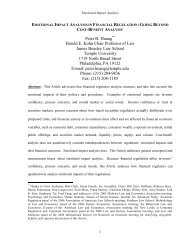Governance, Growth, and Development Decision-making - School of ...
Governance, Growth, and Development Decision-making - School of ...
Governance, Growth, and Development Decision-making - School of ...
Create successful ePaper yourself
Turn your PDF publications into a flip-book with our unique Google optimized e-Paper software.
Thinking about <strong>Governance</strong><br />
Dani Rodrik<br />
A deep insight that has emerged out <strong>of</strong> the disappointments<br />
<strong>of</strong> the Washington Consensus is that<br />
successful policy reform is at its core governance<br />
reform. Reforms in the areas <strong>of</strong>, say, trade or fiscal<br />
policy require much more than just cuts in tariffs<br />
<strong>and</strong> a balancing <strong>of</strong> the budget. If you want to<br />
achieve lasting change <strong>and</strong> have a real impact on the behavior <strong>of</strong><br />
those agents that determine the success <strong>of</strong> reform, you must change<br />
the “rules <strong>of</strong> the game”—the manner in which trade policy is made<br />
or fiscal policy is conducted. This insight, assisted <strong>and</strong> reinforced<br />
by the academic literature on institutions <strong>and</strong> growth, has in turn<br />
produced a new development agenda focused on a broad list <strong>of</strong><br />
governance reforms. These reforms target a lengthy list <strong>of</strong> objectives,<br />
including reducing corruption, improving the rule <strong>of</strong> law,<br />
increasing the accountability <strong>and</strong> effectiveness <strong>of</strong> public institutions,<br />
<strong>and</strong> enhancing access <strong>and</strong> voice <strong>of</strong> the citizenry. The agenda is neatly<br />
captured <strong>and</strong> quantified by the Kaufmann-Kraay <strong>Governance</strong> Indicators<br />
data set.<br />
Much <strong>of</strong> this is for the good. In particular, the tilt towards governance<br />
has the virtue that it helps shift the focus <strong>of</strong> reforms towards<br />
objectives that are desirable end-goals in <strong>and</strong> <strong>of</strong> themselves. The<br />
items on the original Washington Consensus agenda were all <strong>of</strong> instrumental<br />
value at best. Playing around with tariff <strong>and</strong> tax schedules<br />
<strong>and</strong> with the composition <strong>of</strong> public expenditure is worthwhile only<br />
to the extent that it achieves other objectives we really care about:<br />
increased growth, reduced poverty, improved equity. By contrast, it<br />
would be hard to take issue with the intrinsic importance <strong>of</strong> improved<br />
governance along its various dimensions: rule <strong>of</strong> law, transparency,<br />
voice, accountability, effective government. We might even<br />
say good governance is development itself. Combine it with material<br />
well-being, <strong>and</strong> we attain the Nirvana <strong>of</strong> advanced societies.<br />
Dani Rodrik 17
















